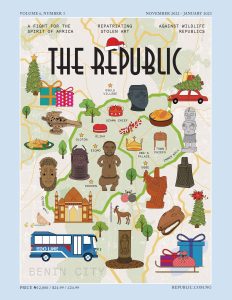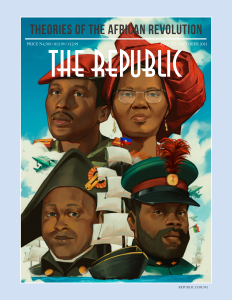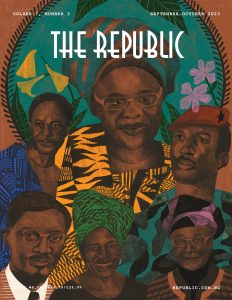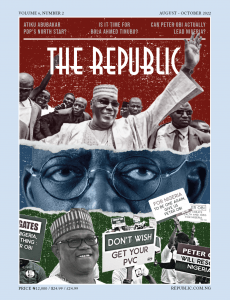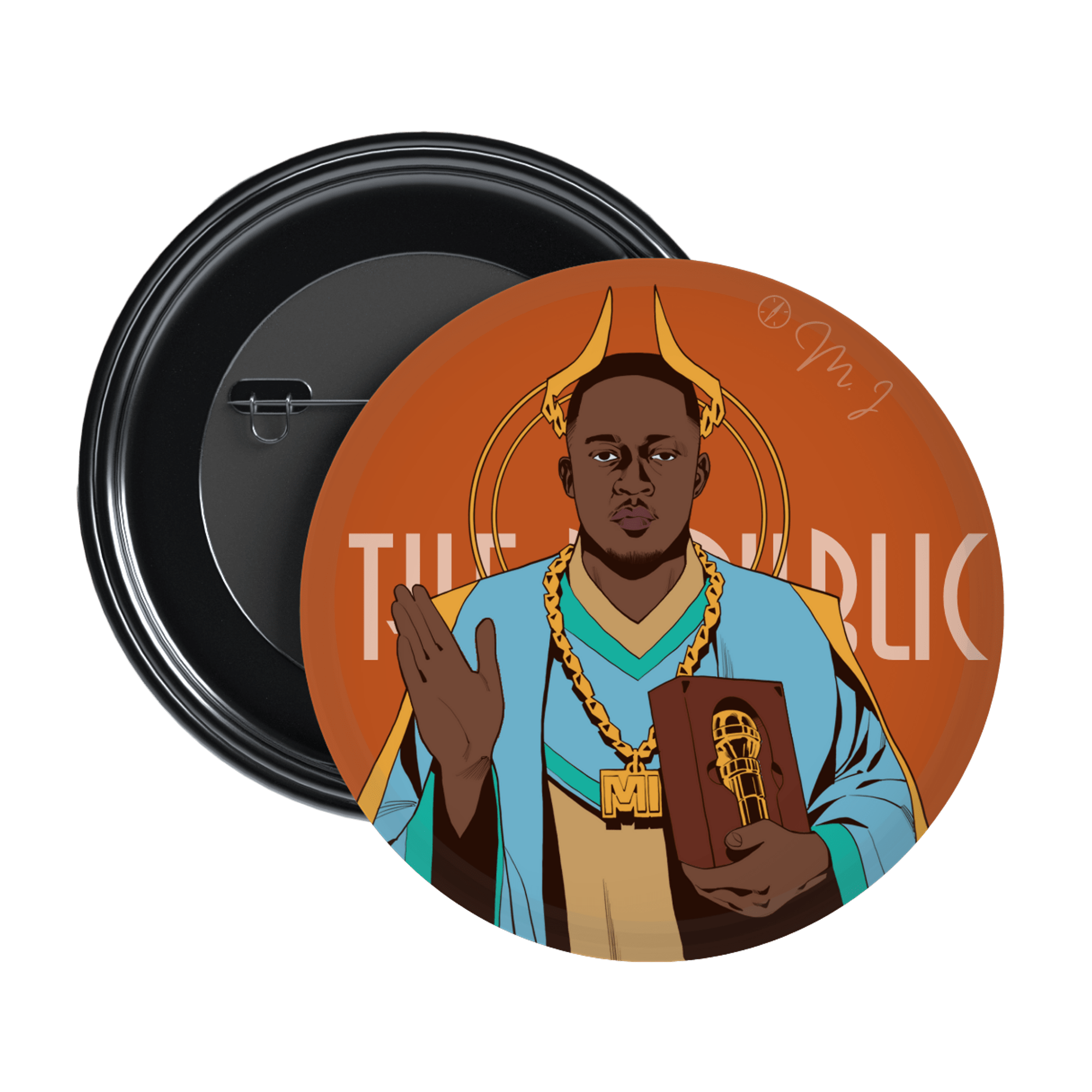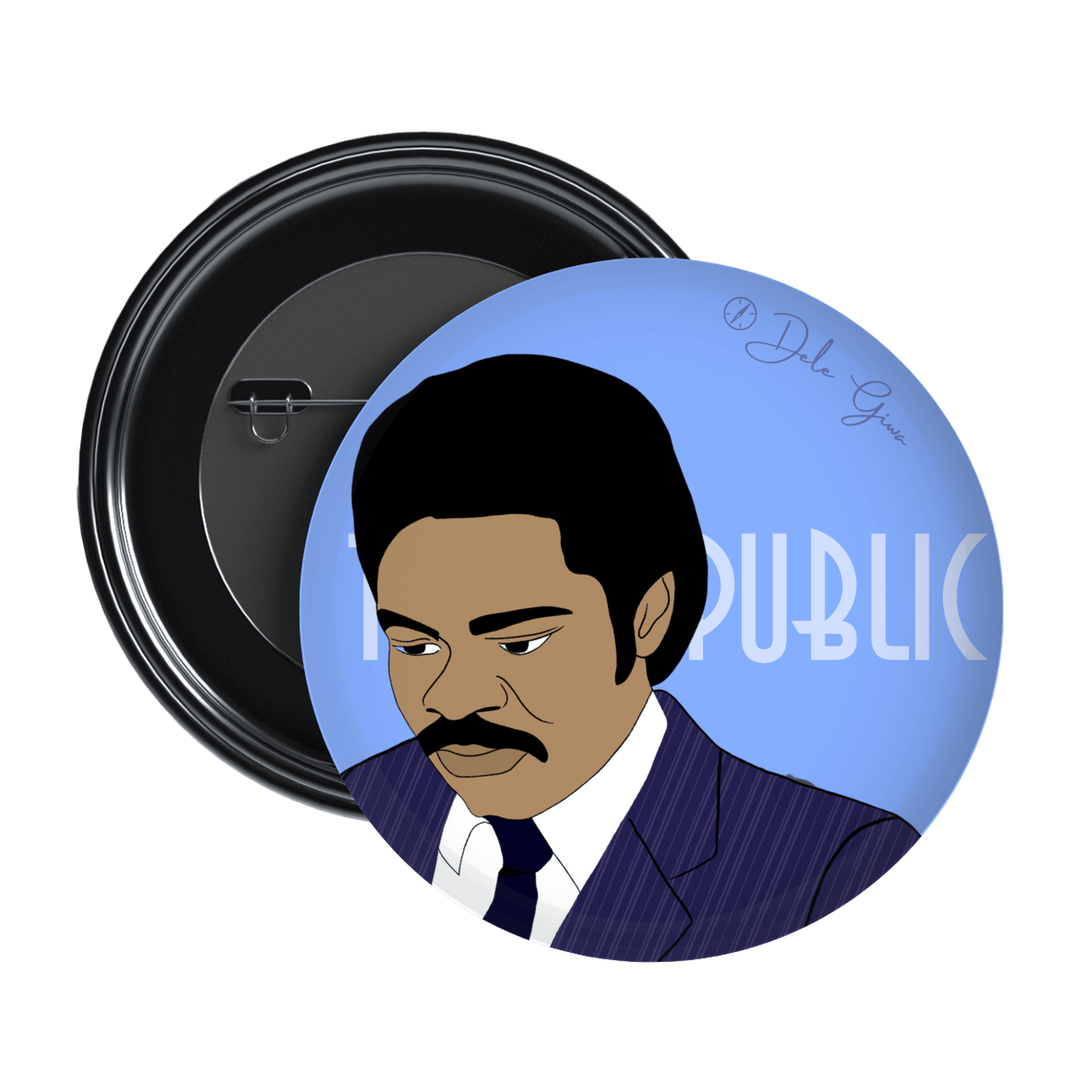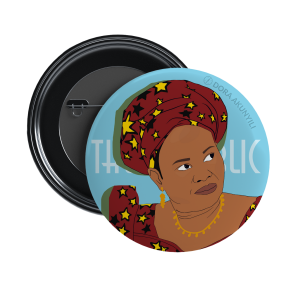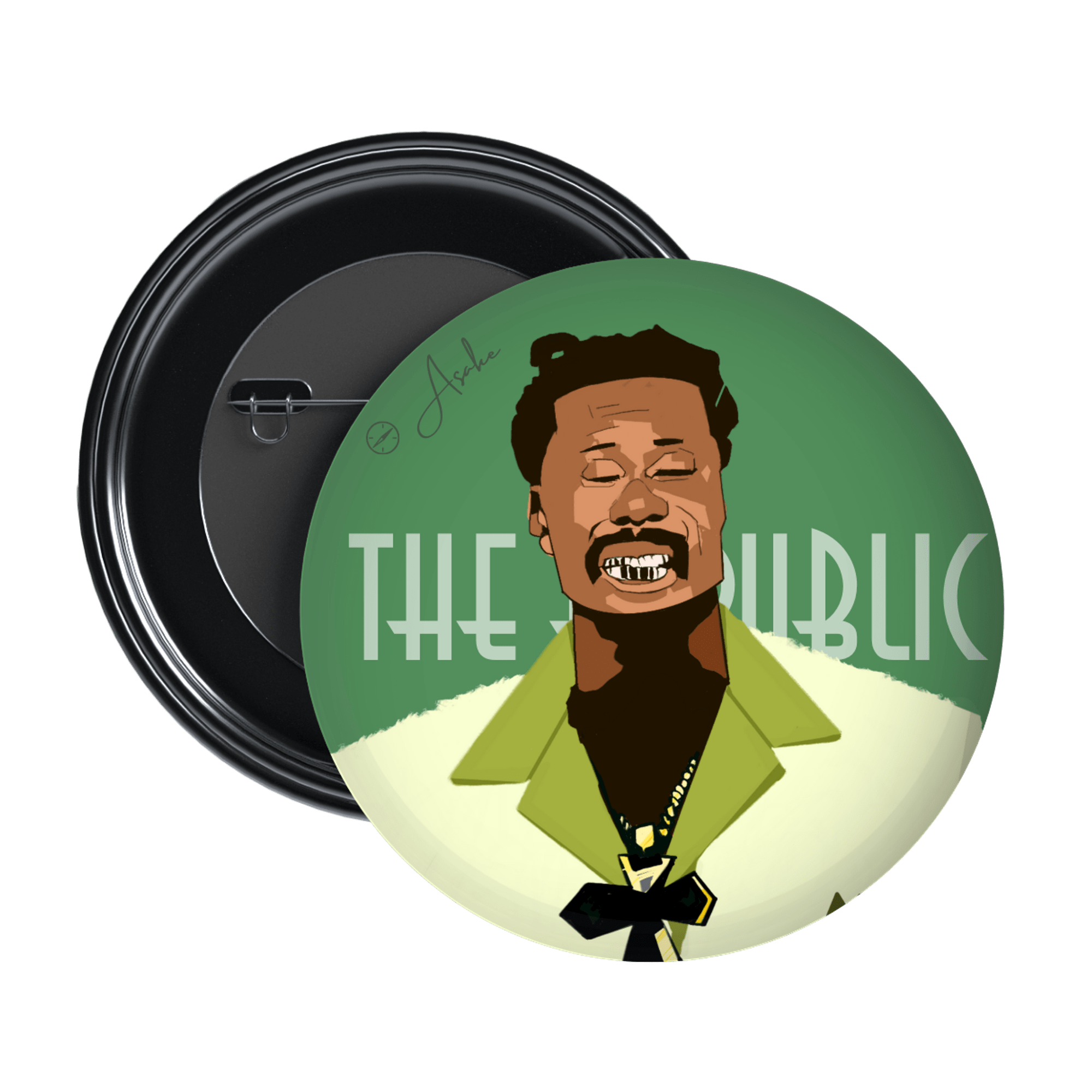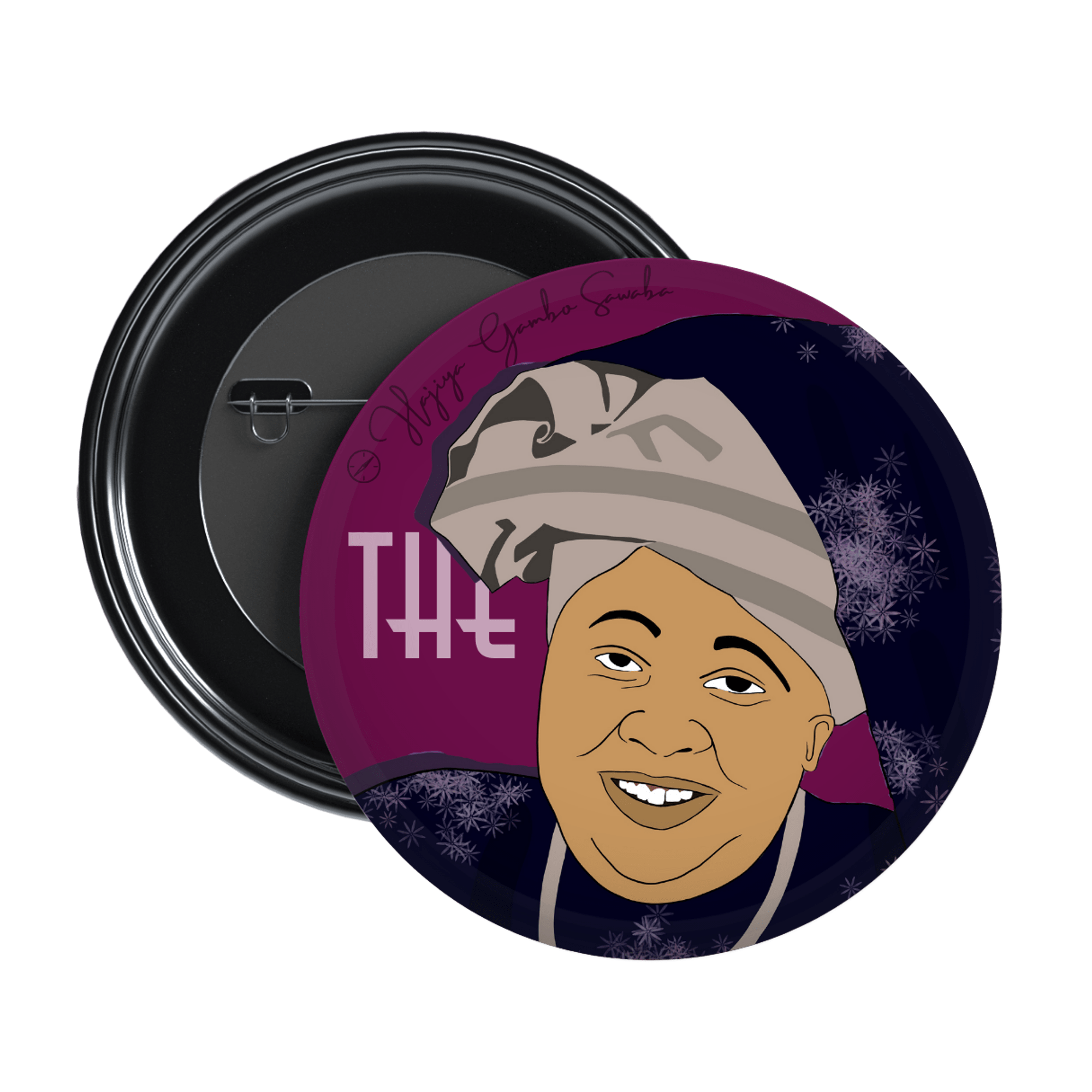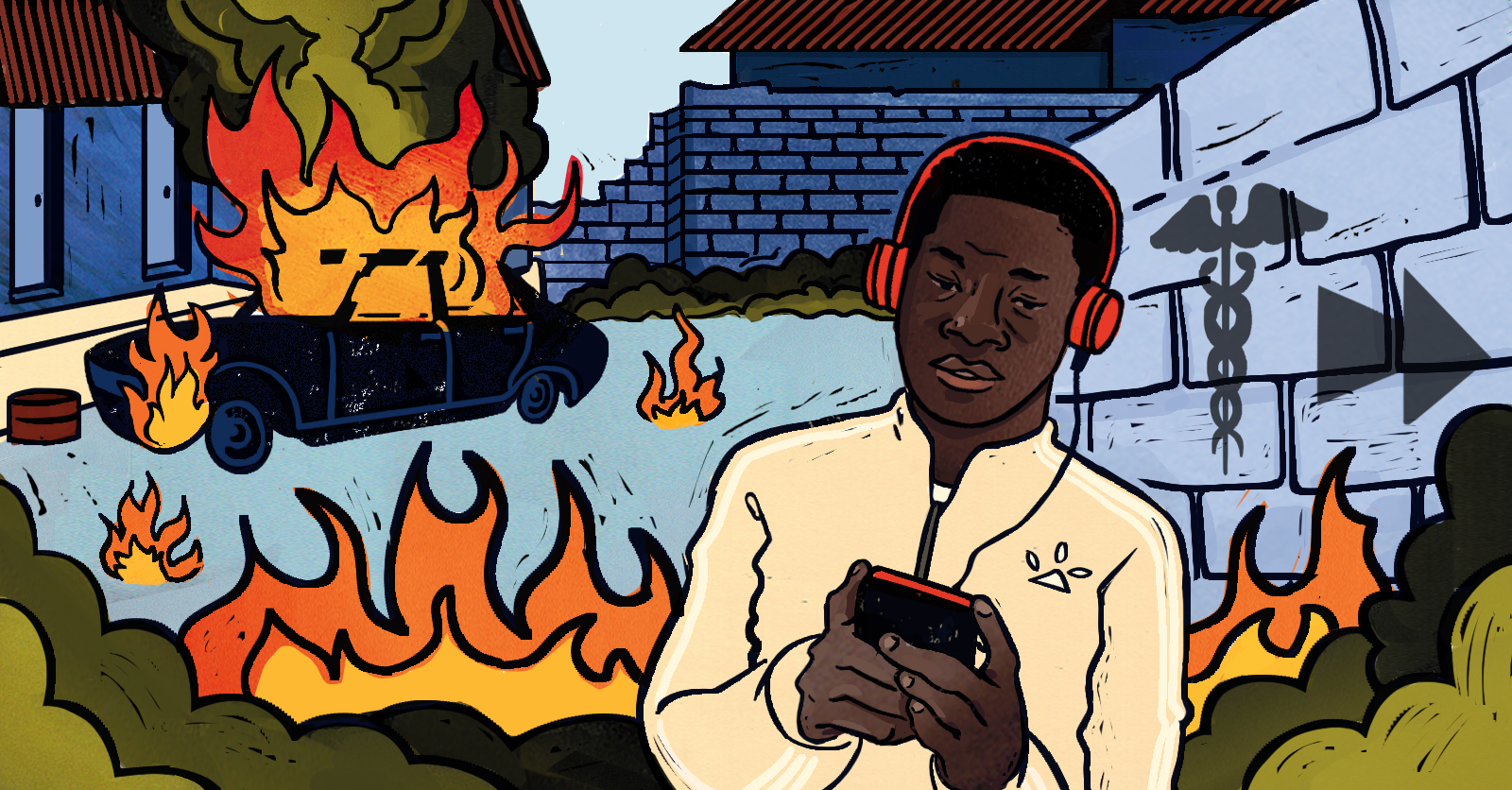
Illustration by Sarah N. Kanu for THE REPUBLIC.
the ministry of CULTURAL AFFAIRS
Fire and Blood and Kendrick Lamar in Jos

Illustration by Sarah N. Kanu for THE REPUBLIC.
the ministry of CULTURAL AFFAIRS
Fire and Blood and Kendrick Lamar in Jos
I grappled with the intimacy I felt with Kendrick Lamar’s song ‘XXX’. Every day, for weeks in 2022 and 2023, as I walked the gravel road from the doctors’ quarters to the hospital, I plugged my ear pods shutting out recollections of the pathologies that plagued the patients under my care. My playlist in alphabetical order, from Aurora’s ‘Runaway’, B.O.C’s Hausa raps, Cyhi The Prince, Doug Kaze’s folk songs, Damian Marley, and Kendrick Lamar. Lamar’s ‘XXX’ contains well-layered verses depicting violence in the United States. Why did it resonate with me, a Nigerian who has never been to the United States? For days I became more introspective, trying to understand how every damn line was a foreign tongue singing the unsung stories of a familiar landscape.
In Jos, the capital of Plateau State in north-central Nigeria, Christianity and Islam are always warring. Since 2001, recurring interreligious fights have continually splintered the peaceful existence between the two faiths as they have deformed into deadly oppositions, like rival cult gangs. Children who were unborn at the time of the first recorded clash in 2001, inherit rivalry and are indoctrinated into hostility towards the other religion. In the obscure manner of the origin stories of certain crises, like the one we have seen in this city, there are two known common tales: One is that a Christian lady crossed a barricaded mosque during prayer against the instructions of the worshippers, prompting a physical attack. The other version is that a Muslim politician, Alhaji Muktar Mohammed, received a federal appointment as local coordinator of the Federal Poverty Alleviation Programme in the predominately Christian Jos area.
Listening to Lamar’s 2017 song, ‘XXX’, about gang clashes and their cyclicality in American streets thrust me into excavating the enduring Jos crisis, exploring how violence fiddles with our psyche.
GUN IN THE MIRROR
Tell me what you do for love, loyalty, and passion of
All the memories collected, moments you could never touch
I gripped the revolver. Its coldness cruised into my blood. I held it up against the mirror like a marksman and stared at my armed image. I never imagined holding a gun in my life. Even in boyhood when, with other boys, I played police-and-thief, imitating war movies, I never fancied the idea of growing up to be a wielder of firearms. Yet, there I was, 17, with one in my parents’ bedroom. It was locally crafted, but nonetheless lethal. I checked the cylinder and collected the bullets in my palm. I supposed my dad’s intention was that it could save us the day terror knocks on us. Recurring attacks had forced people to take dire measures. In my community, people advised one another to procure weapons more lethal than machetes, clubs, and arrows.
I was stunned when I found the gun. I had casually walked into the room in search of a pamphlet, a newspaper, or any little book to read. It was a dull day. My dad’s bedside cabinet was a place I had always found interesting articles since I had not yet developed my own shelf at that time.
My reaction when I saw the revolver was comical. Picturing my dad shooting was ridiculous. My dad, the church elder and pacemaker? The man who would later be crowned the ruler of the Nabor clan of the Anaguta tribe in Jos, who never raised a hand on any of his children or wife or anyone? It was impossible to imagine. When we were kids and mischievous, our mom was the hand that didn’t spare the rod to spoil the child. She would beat us with the spatula used for making tuwo and gwote or the slender one for kuka and okra. She sometimes reported us to our dad, but he always favoured words of wisdom over physical punishment.
But this wisdom of my dad owning a gun in 2012 grew clearer in my mind. The patterns of attack in Jos had grown more unpredictable, more devastating and more complex. From inception, in 2001 up until 2008, it had been Christians versus Muslims, the pattern clearly defined. But by 2010 and subsequently, the activities of the Islamic terrorist group, Boko Haram, muddled in.
A DARK EVE
Hail Mary, Jesus and Joseph
The great American flag
Is wrapped and dragged with explosives
Hail Jos, the capital city of peace and tourism. Really? 24 December 2010. The general atmosphere was filled with merriment. In houses, chicken, beef, goat, turkey, and other meats sizzled in frying pans. Drinks nestled in crates. Local beverages—kunu and zobo—had been brewed. The fried flour smell of chin-chin suffused the air. Beautiful cakes with icing waited to be devoured. Mouth-watering stews glistened their redness in pots. Salad ingredients perched in kitchens. Christmas songs played on radios. Fanfares bloomed at gardens and parks. Carols were happening at various churches. It was the eve of Christmas and the light of the festival shone in homes and public places. The spirit of the season moved, and laughter and joy abounded. In our home, we prepared for the season too.
Earlier that day, one of my brothers had gone to the gathering where a cow had been slaughtered. It had been the practice in our community since I was little. Every Christmas, different groups were formed towards the slaughter of cows. It was cheaper when families shared the cost of buying a cow, and it was good for communal bonding. I liked to represent my family on the day the cow is slaughtered. Butchering a large animal like a cow was quite a sight.
We were doused in a festive air, frying meat and happily chatting in the beautiful dusk, when a loud sound erupted. It was like a synchronized blast of a thousand dynamites. The earth shook. An immediate air of trepidation seized us all. People abandoned what they were doing and clustered outside, inquisitively. Minutes later, another explosion tore into the darkening evening. We soon received word of what the sound was, where it was from and what it had done. They were bomb explosions at Ungwan Rukuba Street. We had people in that community. My maternal grandmother sold delicious kosai in the heart of the area and I had trekked past it for about a dozen years during my primary and secondary school days. There was confusion. We were worried about our relatives there.
My mother went into a panic. Our fear rose when a neighbour burst into an agonizing wail. News had reached her that the exact location of the bombings was the beer parlour at Ungwan Rukuba where her husband had gone not too long ago. His body, or its pieces, was collected from the rubble. Other bits of humans were recovered as well. This neighbour was mourning with guilt. It made her sorrow pierce deeper as she wept bitterly. Everyone knew her husband had been sober. That he had angrily left the house that Christmas Eve because they had a dispute. He was a gentleman, while others perceived her as a proud woman. That night, she and her children were inconsolable. Sympathizers recollected their last encounters with the man.
The entire neighbourhood was in a silent and vigilant mood. And still within that night, three more bombs exploded at Kabong, another Christian-dominated area. We all kept vigil, praying and guarding ourselves with weapons. The grievous mood lasted over the eve, Christmas day, and the days after.
shop the republic
-
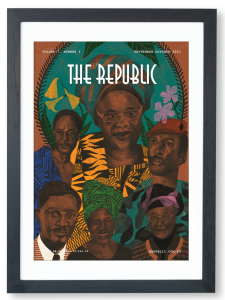 ₦70,000.00 – ₦75,000.00Select options This product has multiple variants. The options may be chosen on the product page
₦70,000.00 – ₦75,000.00Select options This product has multiple variants. The options may be chosen on the product page -
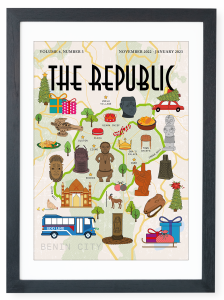 ₦70,000.00 – ₦75,000.00Select options This product has multiple variants. The options may be chosen on the product page
₦70,000.00 – ₦75,000.00Select options This product has multiple variants. The options may be chosen on the product page -
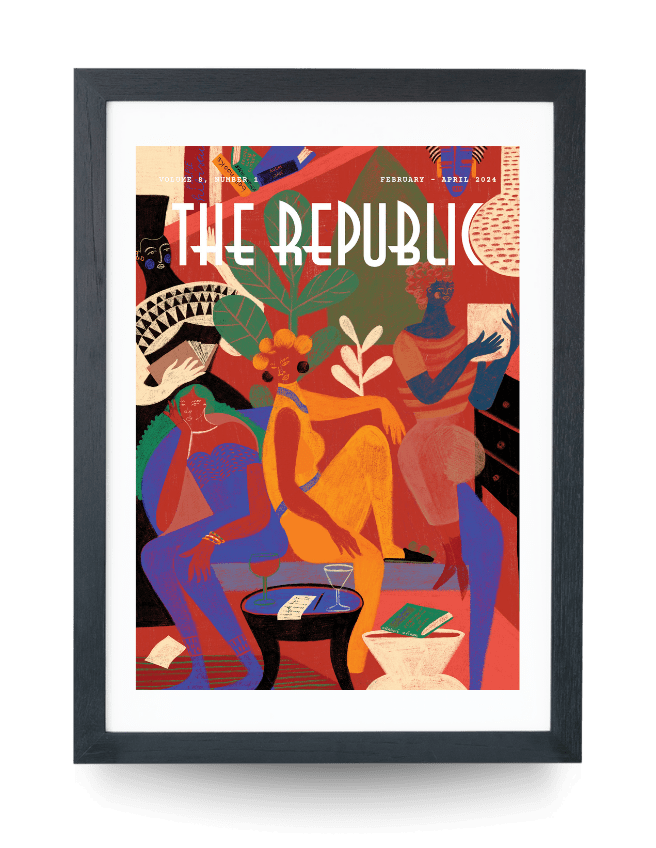 ₦70,000.00 – ₦75,000.00Select options This product has multiple variants. The options may be chosen on the product page
₦70,000.00 – ₦75,000.00Select options This product has multiple variants. The options may be chosen on the product page -
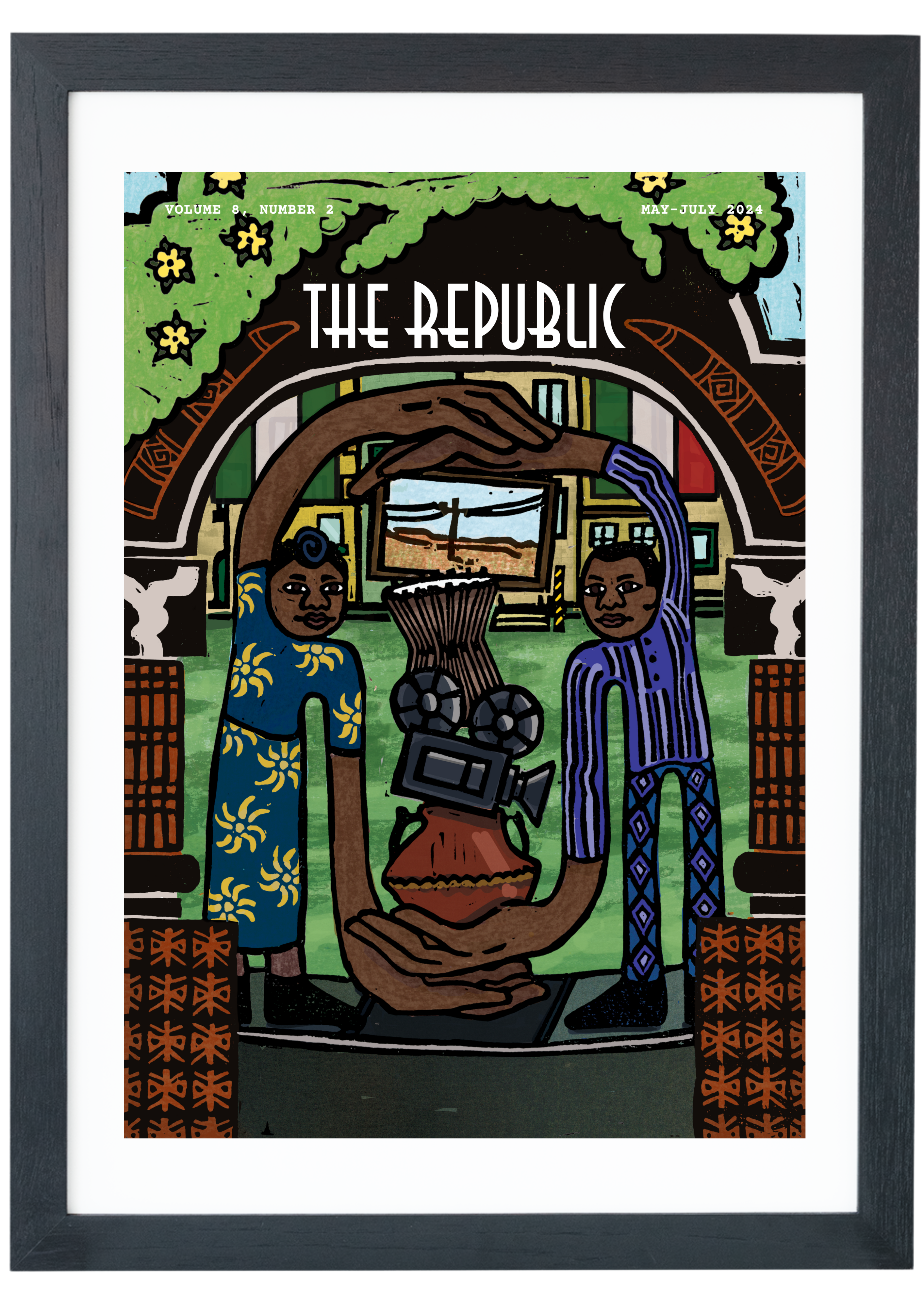 ₦140,000.00 – ₦150,000.00Select options This product has multiple variants. The options may be chosen on the product page
₦140,000.00 – ₦150,000.00Select options This product has multiple variants. The options may be chosen on the product page
shop the republic
-
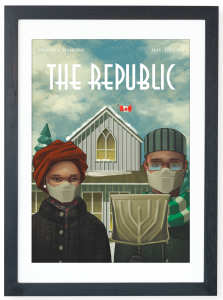 ₦70,000.00 – ₦75,000.00Select options This product has multiple variants. The options may be chosen on the product page
₦70,000.00 – ₦75,000.00Select options This product has multiple variants. The options may be chosen on the product page
MEN WHO EAT MEN
But is America honest or do we bask in sin?
That night of December 2010, a sudden tension rose across Jos city. Christian youths mounted major roads, targeting Muslims. It was a quest for vengeance. Ungwan Rukuba had always been a boiling point during crisis and Muslims steered clear of it. The bombs at Ungwan Rukuba had exploded at the beer parlour where there was a police station and a checkpoint nearby. People were angry that the security didn’t do their jobs. No suspects were arrested. Later, news circulated, as usual, about how there had been rumours and even open declarations of the intended attacks, but nothing had been done by the security agencies which didn’t take it seriously or were even complicit.
The twin bombs were targeted at Christian-dominated areas and were thought to be a well-orchestrated reprisal from aggrieved Muslims. Or from Boko Haram, whose activities in northern Nigeria had increased following the extrajudicial execution of its former leader, Mohammed Yusuf, who was succeeded by Abubakar Shekau in 2009. When Yusuf and a number of Boko Haram members were captured by soldiers, some were executed, some imprisoned. The new leadership of the group threatened terror against security agencies and all who opposed the sect. True to their word, police posts, churches, mosques, and people—Christians and Muslims who antagonized the sect—were targeted. In the same 2010, on 11 September, in neighbouring Bauchi,, a prison was attacked and about 730 inmates escaped. Boko Haram claimed responsibility for the attack and for the rescue of their members.
Generally, the years 2009 to 2010 saw a spike in attacks. While my town nursed the wounds inflicted on it on the eve of Christmas, another town in the northeast, Maiduguri, had also suffered the same fate on the same day. It was easily concluded that the bombings at Ungwan Rukuba were plotted by Boko Haram and not a reprisal.
Ungwan Rukuba was primarily targeted for a number of reasons. There is a widely known notoriety about Ungwan Rukuba: its dense Christian population, thuggish youths, and the wild execution of Muslims in it during a crisis. Crisis times were moments that truly showed the depth of carnality across divisions. In November 2008, another riot erupted following the local government elections in Jos, where rumours of victory for the Peoples Democratic Party Christian candidate, Barrister Timothy Gyang Buba, spread before the official announcement of the winner. Supporters of the Muslim candidate of the All Nigeria Peoples Party, Alhaji Aminu Baba, felt the results were rigged and began violent protests, attacking Christians. There were reprisals in the Christian communities, and I had happened to find my way to Ungwan Rukuba where I was shocked by the blackened body of a man, whom it was said was Muslim. He was burned, his frame leaning against a flaming car, and tagged ‘Moses’. A short distance away, another body burned tar black. I was told some youths dug out the victim’s heart and ate it. It was said they did it following a ritual, a belief that the act demonstrated bravery and complete subduing of enemies. Crises that were labelled Christian versus Muslims were most times moments of barbarism from people from both sides of the divide. People who were inherently psychopathic revelled in such times.
After a crisis, one time, there was widespread speculation that some Muslim butchers were selling human flesh in place of beef. In churches and communities, people were warned against buying meat from the butcher whose source was unknown. Mothers were told not to make soups and stews with meat. That for the sake of their families they should avoid beef. Young people were especially dissuaded from eating suya. That if they couldn’t control their gluttony, it would lead them to eat staked human flesh. My mother, though cautious, still bought meat from the market. I remember sometimes eating fearfully, wondering if it was truly beef. Now that I think of it, perhaps even within the Muslim communities at the time, there must have been warnings against buying meat sold by Christians.
shop the republic
-
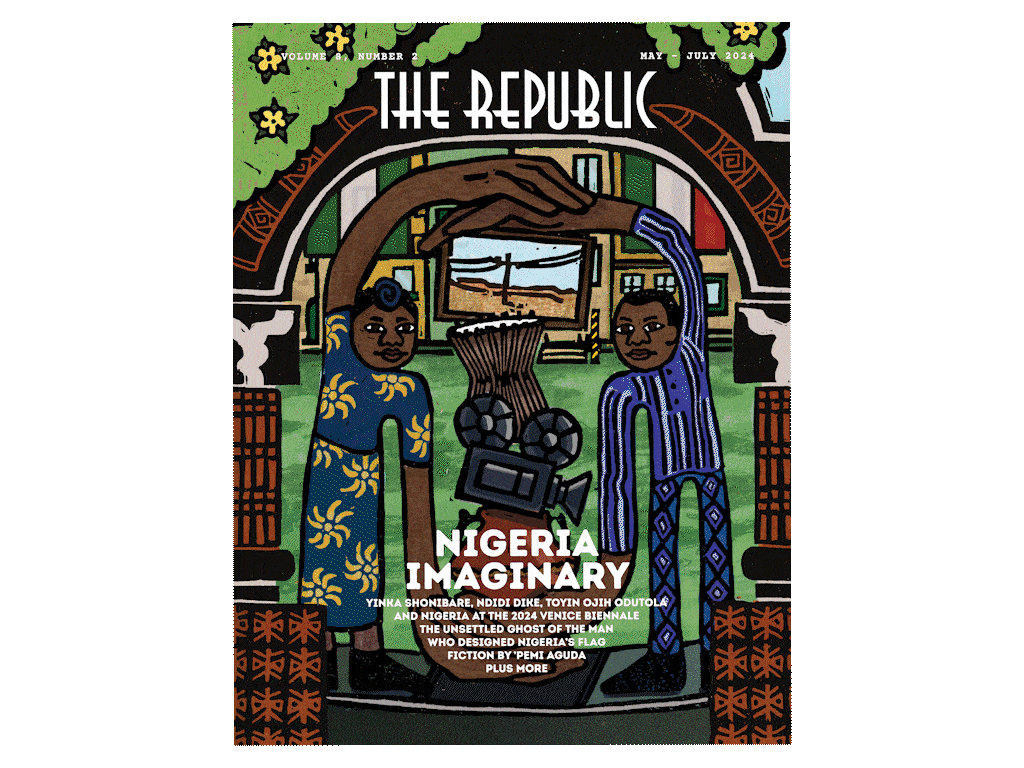 ₦10,000.00 – ₦30,000.00Select options This product has multiple variants. The options may be chosen on the product page
₦10,000.00 – ₦30,000.00Select options This product has multiple variants. The options may be chosen on the product page
shop the republic
JUDASES AMONG US
I can’t sugarcoat the answer for you
This is how I feel—if somebody kill my son
That means somebody’s getting killed.
11 December 2011. The night was heavy with the sullenness of my elder brother and me. Our parents had vexed us after forbidding us from going to the football viewing centre in the area to see the ‘El Classico’. The night was a long-awaited one for the clash between Spanish clubs, Barcelona and Real Madrid. We had anticipated the fixture eagerly, monitoring time and making predictions. We both supported the English football club, Manchester United, as well as Real Madrid. Our community was a football-loving one. We played in every street corner and, fortunately, some of us had the opportunity to represent the country at various levels—from the Under 15 to the national team. Some went abroad to play in Europe and Asia. Football banter was a norm that gave us cherished moments and El Classico, one of the most watched matches in football, the clash of two Spanish giants, was a day no lover of the game wanted to miss.
As the game progressed, a loud cheer followed. It tore through the quiet of the night. From our house, we felt the euphoria of the moment. A team had scored. Another goal followed. Our hearts pumped with every roar from the viewing centre. As we wallowed in the disappointment of not being there, a louder sound, like the symphony of underground thunder breaking the earth, erupted. The night suddenly became roused. People woke from sleep and, as usual, questions began to leave mouths—not about what might have possibly happened. We knew. We had understood the sound, its texture and abruptness. The only question was: how many casualties?
We soon confirmed that it was at the viewing centre, just after half time. It was rumoured the bomber likely snuck inside at half time when banter and the rowdiness within distracted viewers from any suspicion. I had thought of defying my parents’ order to watch the remaining half of the match. My parents, like some prophets, had insisted against me and my brother leaving the house that night. Was that how they would have lost their two oldest sons in a bomb blast?
Later, we confirmed the casualties. My favourite barber on our street, SHGY and my neighbour, NLN are the ones I remember. SHGY’s partner had just given birth to a boy at that time. His son will grow up without him and one day learn of the manner death came to his father, inherit enemies, and struggle with vengeance and forgiveness. The other victim, NLN, was a childhood friend, smart and gifted left-footed footballer. He excelled both academically and in sports. He didn’t lose his life, but the explosion left him with a head injury that affected his cognitive function, and he is now incapable of living as an independent adult. No doubt he could have excelled as a footballer, or physicist, as he was pursuing the degree.
Rumours of sellouts began to emerge, that some members of the community collected money from Boko Haram to attack their own people. Young people who abused alcohol or drugs, any shifty young person generally, were top suspects. Whether there were Judases amongst us or the terrorists had camouflaged to infiltrate us, one thing was apparent—the terror had come home.
My father could not accept the possibility of losing anyone in the family. My elder brother would later tell me about overhearing the gun seller and our father discussing acquiring that weapon. After the bomb tragedy, people acquired ammunition and readied for whatever. Watch and pray was the mantra—watch meant arm yourself and be on guard because God would not come down to block machete strikes, flying bullets, or nullify bombs.
GIRL BY MY WINDOW
Johnny caught a body yesterday out hustling
God bless America you know we all love him
2022. I was in a depressive mood in the morning when images of hacked and burned bodies of the Anaguta, my own people, flooded my WhatsApp. In one photograph that particularly haunted me, a toddler crawled in the ash ruins of bloodied bodies. I lay quiet in bed reading WhatsApp posts of lamentations, grief, and curses at the perpetrators, the complacent government, and security agencies. The savagery was committed in the night and a friend near the community told me her father had tirelessly called the security forces that night.
There was a general outcry of nonresponse from security throughout the three hours of havoc. The day carried on as a gloomy one. I had no interest in anything. In the Jos University Teaching Hospital, my clinical rotations and lectures had been put on hold as resident doctors were on strike. It was already my tenth year in university as an undergraduate. The unending duration of my studies caused by the Academic Staff Union of Universities and Association of Resident Doctors strikes, the recurring Jos crisis, and failed exams, wore me down. Later, in the evening, a co-tenant knocked on my door. ‘You dey inside?’ he asked.
‘I dey, how far?’ I answered.
‘With wetin dey happen for town you suppose comot outside mek we dey know wetin dey happen.’
I remained indoors until twilight when he knocked again.
‘Guy, comot nau. No sleep this night o!’
‘I hear you.’
‘Dem say mek we dey alert o! Say dem see some unknown men with guns dey hide near road to Gwash,’ he said, urging me to go out for vigilante duty.
We stayed up most of the night until sleep eventually curtained our eyes. The next day, I woke up late to the voice of a girl by my window. It was a familiar one. She had been seeking the affection of my co-tenant, but he had been unromantic toward her.
‘My bro do am,’ she said. ‘And popsy know say na im do am.’
The tone of discourse was not worrisome but a narration of heroism. A glorification of a murder perpetuated by her sibling in the name of retaliation for what had happened to the Christian community of my Anaguta people that was attacked and razed.
The girl was in her early twenties. Her younger brother was likely an adolescent. He had taken a life and the circumstances made her think it was bravery, something commendable, and even deserving praise. She narrated how her father, being the youth leader, insulated her brother from the security agents who got wind of the lone strike.
Sadly, many boys on both sides think it is glorious to take an enemy’s life. I have seen clips of Muslim boys butchering and setting people ablaze while chanting ‘Allahu Akbar’. The voice of the girl by my window sent me into a deeper puddle of despair. When would this end? I knew that the disappearance of the victim would not go unnoticed by his family, friends, and community. And when, eventually, a conclusion was made that he wandered into a Christian community, his people would accept his demise and make plans for a reprisal attack.
A TOWN OF HOMICIDAL HEADS
He said, ‘K-Dot can you pray for me?
It’s been a fucked up day for me
I know that you anointed, show me how to overcome’
He was looking for some closure
Hoping I could bring him closer
To the spiritual, my spirit do no better, but I told him
‘I can’t sugarcoat the answer for you
This is how I feel—if somebody kill my son
That mean somebody’s getting killed’
Over the years, as we discussed in the neighbourhood, I’d often ask, ‘What will you do if your loved one is a casualty?’ People would answer with what they felt was their sincerity: ‘Bro, my church-mind be say na eye for an eye and tooth for tooth.’ This was, mostly, the mindset of Christians. In the Muslim community, the response is, ‘If you shit for mosque, no mercy.’ These declarations, even by the calm headed.
It’s no lie that clerics of both faiths, whom people turned to for guidance, have proclaimed that members arm themselves. Devotees of religions have often declared, with red-eyed vexation, that God be tossed aside while they deal with these recurring conflicts humanly. ‘Abeg, keep God matter for side,’ they say. In a country where religion is at the centre of existence, its sincerity is very questionable. Post-crisis periods have often been followed by interreligious meetings with the aim of building peace. The peace hasn’t happened. It’s either the meetings are pretentious fronts, or the recipients of the peace sermons are unrepentant and unforgiving troublemakers. How then is the loop of fire and blood going to be snapped? You tell me.
‘I know that you anointed, show me how to overcome.’⎈
shop the republic
BUY THE MAGAZINE AND/OR THE COVER
-
 ₦140,000.00 – ₦150,000.00Select options This product has multiple variants. The options may be chosen on the product page
₦140,000.00 – ₦150,000.00Select options This product has multiple variants. The options may be chosen on the product page -
 ₦10,000.00 – ₦30,000.00Select options This product has multiple variants. The options may be chosen on the product page
₦10,000.00 – ₦30,000.00Select options This product has multiple variants. The options may be chosen on the product page




